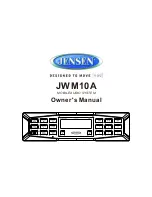
AV inputs “Audio/Video 1” and “Audio/Video 2”
Any video source with composite video output and analogue stereo output can be
connected to the MI 2200. The MI 2200 switches through video signals of all video standards.
Please ensure that the connected monitor is capable of displaying the television standard of
the relevant video source.
☞
Connect the video output of the video sources to the yellow RCA/Cinch sockets of the
MI 2200.
☞
Connect the audio output to the red (right channel) or white (left channel) RCA/Cinch
sockets of the MI 2200.
Reversing camera input “Camera”
☞
Connect the VDO Dayton reversing camera to this input.
Monitor outputs “Monitor 1” and “Monitor 2”
☞
Connect the VDO Dayton monitors to this output.
✎
If one monitor is to be used as a front monitor, connect it to the “Monitor 1” output.
Navigation computer input “Navigation”
☞
Connect the VDO Dayton navigation computer to this input.
Install MI 2200
A
Do not install the unit in positions where it is exposed to high temperatures, dust, dirt or
excessive vibration (e.g. due to direct sunlight or heating vents).
Select installation location
The MI 2200 multimedia interface should be installed in a location, at which the “Status”
LED remains visible, even after installation.
A
The MI 2200 must on no account be installed in the following locations:
❏
Directly below the heated rear window or other heated screens.
❏
Near to electric motors or other aggregates of the vehicle electrical system.
❏
Near to wiring harnesses of the vehicle electrical / electronic system.
❏
At locations, where it is exposed to high temperatures or direct sunlight.
❏
At locations with excessive humidity, spraying water or dirt.
When selecting the installation location, accessibility of the audio / video inputs for
subsequent retrofitting or conversion should also be taken into account.
Installation
The MI 2200 can be secured in a suitable installation location, using the screws supplied with
the unit. For this purpose, four fastening tabs are provided on the MI 2200 housing.
■
Remote control
☞
Remove the security strip that protrudes from the battery case.
✎
The remote control is now ready for use.
Notes:
Never expose the remote control to direct sunlight or extreme heat. The batteries are
discharged and the risk of leakage is increased.
Only use leak-proof batteries. Battery leakage can cause damage to the remote control or to
your car.
In many countries exhausted batteries may not be disposed of with your household waste.
Please determine how to dispose of exhausted batteries according to local regulations.
INSTALLATION INSTRUCTIONS
9
English





























